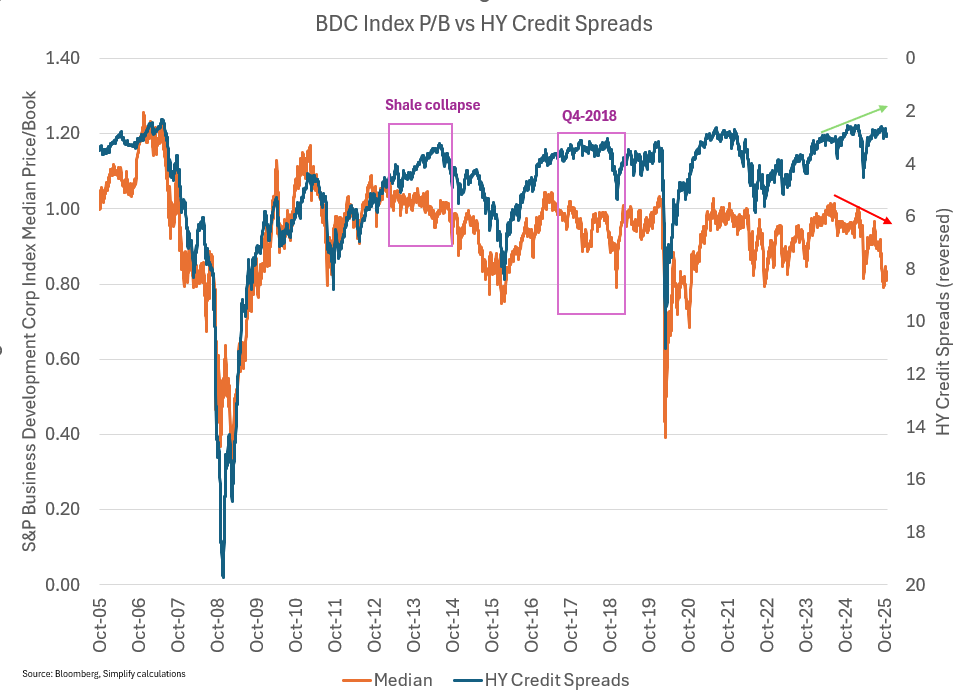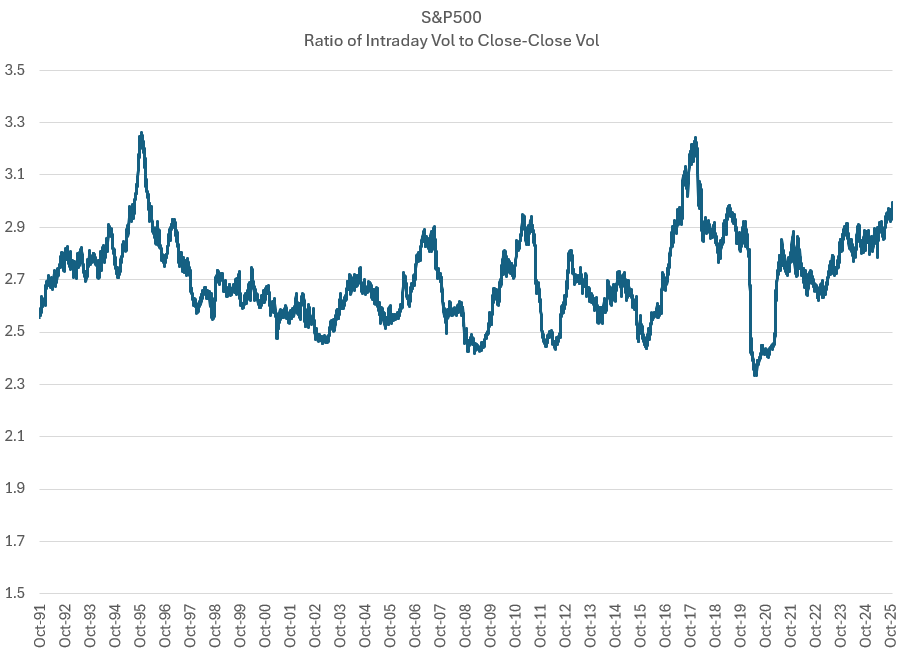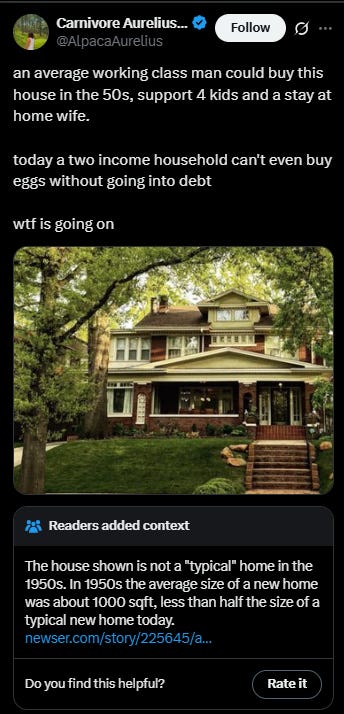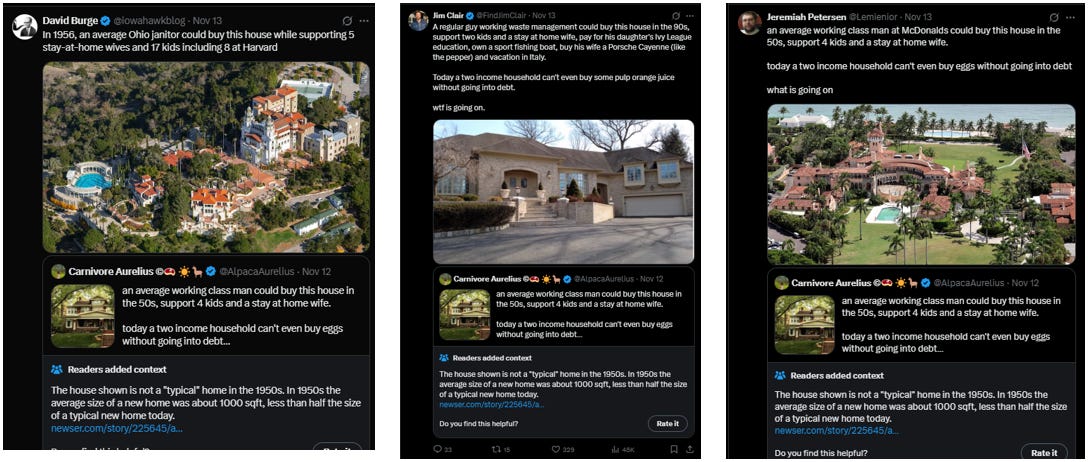Are You An American?
"They" Are Preparing You for "Hard Times"
I’m going to spend two minutes on markets and then I’ll climb the Substack soapbox…
On markets, 2025 has been an adventure. While equities have once again ruled the day, they have done so with high volatility; adjusted for volatility (and assuming a 4.5% financing rate to add leverage), high yield has been the place to be. Hedged variants have done even better:
And while BDCs have indeed rallied since I profiled them in “Pay Attention to Our Privates,” the gap between HY and BDCs remains near record highs. In other words, I still like being long credit spread hedges even as BOTH mandate and conviction sends me towards bonds and duration.
The December rate cut is now firmly in question, as I had suggested might happen due to misconceptions around seasonal inflation adjustments.
My GUT thinks Powell and his increasingly fractious cat herd will take a “safety cut” regardless, leaving less interest income for the wealthy while solving little for those who need credit access. With tariff rebate checks flowing to the latter in the spring, unfortunately predictable, it feels like 2024-2025 is going to replay. Cut in December and then wait at least until May.
Meanwhile, while equity markets look short-term vulnerable with the S&P500 dipping below the 50-day moving average for the second time in the past week — the first occurrences since the Tariff Tantrum, late-day rallies have managed to pull us above both times. Consolidation after tremendous gains, breakout and breakdown appear equally likely. On a longer term basis, I am watching the increasing volatility of intraday movements even as “close-close” volatility remains muted. The latter is important for systematic strategies like volatility control, which are now adding back to positions trimmed in October. The former, intraday, is important because there are limits to market makers book depth; should intraday volatility continue to rise, the risks of a “break” in continuous pricing grows. But in the meantime, as much as it pains me to say it, these periods have generally been “continuations” rather than endpoints in extended bullmarkets.
This past week Twitter went mad(der).
A simple tweet from a “right-wing influencer” noting that 1950s working-class men could afford houses, families, and dignity triggered a thousand nearly identical mocking responses. Not debate—choreographed ridicule.
The crime? Remembering that Americans once owned things.
The mockery template was uniform: “In [earlier time], a [low-status job] could [impossible thing].” Janitors with castles. Cashiers with yachts. Peanut farmers as presidents (note, this actually happened).
This wasn’t organic humor. This was narrative discipline.
Then came @vrexec (an “American in Europe” according to his sparse bio) with a “reasonable” detailed explanation, pointing to a modest New Jersey Cape at $600-700K as proof the American Dream still lives. Just save $150,000 for a down payment. Maybe join the military. Work hard for 5-10 years. Stop being entitled.
His longform tweet is worth reading in detail (emphasis is mine):
I know (hope) the post is satire, but here’s what I’ve got to say on the matter.
This is where my mother grew up with 6 siblings and 3 dogs. Irish Catholic family in the 1950s northern New Jersey suburbs. My grandfather was a Teamster who earned his “1 Million Miles” driven. My grandmother was a homemaker. Both served in WW2. He served in China driving hovercraft. She worked in a factory manufacturing bombs.
You think they had it easy?
You think this house is gross and that you deserve better? Why is that? You think you are entitled to a sprawling place like the ones on HGTV, where you can entertain friends and have an open floor plan so you can sip your cocktail or latte with your laptop while you watch your kids play on a large flat safe surface in plain sight of you?
This house and many around it are still there, structurally unchanged since the original construction. They are selling for $600-700K. Roughly $4,500/month all-in including property taxes. Many young people have moved there and are raising great families. You can walk to the school nearby. Fire department around the corner. Pizza shops, delis, and even the train to NYC are a reasonable walk. Kids still ride bikes around the neighborhood just like I did 30 years ago, visiting grandma, and just like my mother did 60 years ago, living there.
Many in the younger generation are emotionally unfit for adulthood because they have not experienced any true hardship. They have never felt existential pressure. So they complain about relatively non-existent problems in their lives as victims of things “they” did to them.
I think there are two things going on.
One is the social engineering. I say that loosely because I am not a conspiracy theorist. Espousing conspiracy theories is a form of neo fascist populism aimed to strip individuals of personal agency and responsibility by blaming some mysterious “they” for their troubles and failures. But there really was an effort, even if well-intentioned, to demonize trades, self-employment, and working with your hands in favor of a knowledge professional class that would outsource all physical hardship and labor to other countries (or people from other countries). This produced a generation and a half that does not understand basic mechanics, the physical world, or how to get by on their own.
It also spawned this crazy belief that children should always be better off than their parents. Absolutely not. The word “should” is dangerous. Our children have better opportunities, but not guaranteed outcomes by default. Believing otherwise is directed society talk. It is extreme socialism dressed up as optimism. Life is about opportunity, not entitlement. And young people today have an order of magnitude more to be excited about and to do than even Gen X let alone the Boomers. If you cannot see that you might be a lost soul and there is little a stranger on the internet can type to change it.
The second thing is the deinstitutionalization of sick and demented people in the US as a result of Reagan era policies. This was problematic in the 1980s and 1990s and 2000s when the millennial and early Gen Z generations came of age. It created a distinct lack of safety for the Gen X and boomer generation to let their kids go explore the world on their own.
Both of these factors produced a fundamentally fearful generation of young people... which automatically translates to a desire to be near their “mommy and daddy”. And in many ways, they look to the government or society to substitute as “mom and dad” because they can’t fend for themselves. Remember my neu-feudalism post? Same idea.
So the idea of moving far away from their both physical and emotional comfort zone is deeply uncomfortable, if not insane to many young “educated” people. This is why you see memes about Millennial/Gen Z couples calling their father or father in law over to rewire a light fixture or fix something in their house. Nobody knows anything. Nobody understands anything.
So if you want to live near your parents in the same town where you grew up... you are already asking for a lot generationally speaking.
There is nothing wrong with this house and neighborhood and $4,500/month with a $150,000 down payment is not a huge hurdle if you educate yourself and work hard for 5-10 years. You would have rather driven a semi a million miles after driving hovercraft in WW2? Well, you can actually do this right now. Go join the armed forces then come back 5 years later and drive a truck. It’s an awesome career path. Can even get your MBA and help from the government.
But if you simply despise the aesthetic or maybe want more for less, then you have to move to a less developed part of the US or the world and help that area develop and grow through your efforts and your new roots.
That is the entire story of America.
Are you an American?
His thread ends with the ultimate loyalty test: “Are you an American?”
The message was unmistakable and reflected “Uniparty beliefs”: Real Americans no longer expect what their grandparents had. Real Americans accept Klaus Schwab’s prophecy—”You’ll own nothing and be happy”—or they’re not American at all.
The Mamdani Trigger
The timing is not accidental.
In November 2025, Zohran Mamdani wins the election in NYC, running on material politics—public housing, rent control, actual affordability—rather than the vibes-based identity liberalism the Democratic establishment has used for decades to avoid economic issues.
A socialist wins in NYC one year into Trump’s presidency. This terrifies everyone who relies on the pretense that scarcity is natural. That Zero to One is a template.
Young progressives started wondering: If we can elect socialists in New York under Trump, why accept permanent precarity anywhere?
The elite response (primarily liberal, but conservatives chimed in as well) was immediate and predictable: Not that these demands are wrong. Not that they’re unrealistic. But that they’re un-American.
A year after Trump won on economic populism—and with Mamdani proving the left can win with its own version—liberal elites deployed their mockery apparatus to convince their own base that wanting economic security makes you not fully American.
How the Mockery Machine Works
Start with a legitimate grievance (housing is unaffordable)
Exaggerate it to absurdity (janitors demanding mansions)
Treat the absurd version as the real claim
Blame the claimant for “entitlement”
Reframe the original grievance as un-American
This maneuver allows elites to redefine the request, “I want what my grandfather had” into “I want everything for free.” Thus, the problem becomes you, not the political economy.
“You’ve never had it so good,” they insist.
Unspoken: Keep complaining, and you’ll learn what bad really looks like.
The Participation Trophy Generation Gets the Bill
Kennedy’s 1962 call—”ask not what your country can do for you”—came after the state massively expanded opportunity: the GI Bill, subsidized mortgages, public universities, highways. The ask followed the give.
Today’s version perverts this completely: “Ask not what your country can do for you—ask why you think you deserve anything at all.”
But FDR understood something our current elites pretend to forget. In 1944, he warned: “True individual freedom cannot exist without economic security and independence. People who are hungry and out of a job are the stuff of which dictatorships are made.”
The mockery campaign is playing with fire. By making economic security seem un-American, they’re creating exactly the conditions FDR warned against—a precarious population primed for extremism.
This is especially cruel when aimed at Millennials and Gen Z—the generations trained from childhood to believe they were special, expressive, and destined for meaningful work. Heck, even the Fourth Turning labeled them “The Hero Generation.”
They obeyed every instruction:
Go to college (as commanded)
Follow your passion (as instructed)
Check your privilege (as demanded)
Pursue meaning over money
Believe in diversity
Experiences > things
And now the same system tells them that wanting a home—the very baseline of adult stability—makes them spoiled and un-American.
The “participation trophy” generation is accused of entitlement for expecting meaningful participation in the economy.
The suggestion that young Americans should join the military to maybe afford a starter home isn’t motivational. It’s feudal. Service in exchange for the chance at shelter - the logic of vassalage, not citizenship. And as a reminder, I have a son in the Navy.
The Mathematics of Impossibility
The quoted thread suggests the New Jersey home is affordable if you’re willing to compromise on HGTV aesthetics, so let’s do what the author avoided:
The Basic Math:
Median truck driver gross income in New Jersey: $65,000
After taxes (~26%): $48,100 take-home
Required down payment (20%): $120,000–$150,000
Monthly payment + taxes: $4,000–$4,500
Annual housing cost: $48,000–$54,000
The punch line: Annual housing cost exceeds total take-home income for this “modest” home.
But here’s what was buried entirely—property taxes alone tell the story of systematic extraction.
In 1955, a Teamster made about $5,300 gross ($4,770 after tax). The poverty line for a family of four was $2,800, leaving $1,970 in “surplus above subsistence”—money for everything beyond bare survival.
Property tax on that $12,000 house? About $264/year.
That’s 13% of the surplus.
Today, that truck driver makes $65,000 gross ($48,100 after tax). The poverty line for a family of four is $31,812, leaving $16,288 in surplus.
Property tax on that same house? $10,700/year.
That’s 66% of the surplus.
Let that sink in:
1955: Property tax took 1/8 of your breathing room
2024: Property tax takes 2/3 of your breathing room
The tax alone—before you even touch the mortgage—went from a modest skim to a dominant claim on everything above subsistence. Property tax consumes five times as much of a working family’s margin as it did in 1955.
This is before:
The mortgage payment (impossible at these prices)
Healthcare (can bankrupt you even with insurance)
Childcare (eliminates the second income or consumes most of it)
Student debt (follows you to the grave)
And renting is not the answer because that property tax is embedded in rental prices.
You cannot “work harder” than arithmetic. You cannot “bootstrap” your way out of property taxes consuming two-thirds of your surplus above subsistence. Calling that impossibility a character test isn’t inspiration—it’s gaslighting.
When VEO says “$4,500/month with a $150,000 down payment (MWG: 9.2 years of truck driver surplus above poverty vs 1.2 years in 1955) is not a huge hurdle,” he’s asking you to ignore that property tax alone—the part you never stop paying, the part that rises every year—has become a poverty trap.
The American Dream didn’t get more expensive. It became structurally impossible.
The Two-Party Ownership Suppression System
Again, this is not a Democrat vs Republican issue. Republicans tell their base: “You can’t own because of regulation/taxes/government,” and offer 50-year mortgages. Democrats tell their base: “You shouldn’t want to own because ownership is privilege and density is moral.” Both arrive at Schwab’s endpoint: You’ll own nothing. Only the emotional framing differs: The right is told to be angry and applaud as anti-Semites rise to power. The left is told to be grateful and applaud as anti-Semites rise to power. At least there’s a unifying theme!
Subscriptionized Civic Membership Environment (SuCME for short)
The new American social contract is not ownership—it’s obligation:
Housing: Rent forever or buy with a 50-year mortgage that effectively ends amortization
Transportation: Subscriptions and leases
Education: Daycare for most, private tuition AND property taxes for those who can
Healthcare: REQUIRED insurance that covers little
Retirement: Work until death to pay off that “affordable” 50-year mortgage and accumulate MOAR assets in the hope you won’t run out
Children: Optional luxury good
This isn’t a future scenario. This is now. The mockery exists to make you call it progress.
The Dangerous Simplicity of the Original Tweet
The response frenzy wasn’t about economics—it was about memory.
The original tweet expressed something subversive in its simplicity:
1950s: One working-class income → house + family + dignity
2025: Two incomes → rent + no kids + debt
No ideology. Just math. And math is dangerous because it proves the decline is real—not imagined, not nostalgic, not entitled. Real.
The numbers don’t lie: property taxes went from consuming 13% of a working family’s surplus above poverty to 66%. That’s not perception. That’s arithmetic.
This happened through decades of bad management and weak choices:
Zoning laws that restricted housing supply
Tax policies that shifted burdens from capital to labor
Educational credentialism that created artificial scarcity
Healthcare costs allowed to spiral unchecked
Financial deregulation that turned homes into speculative assets
Each choice seemed reasonable in isolation. Together, they created systematic impossibility.
The coordinated mockery exists because acknowledging the math means acknowledging the failure. Not conspiracy—just compound incompetence and capture. Thousands of policy choices that consistently favored asset owners over workers, incumbents over newcomers, complexity over simplicity.
That’s almost worse than engineering. At least engineering implies intention. This was drift—a society too weak to maintain what it built, too captured to correct course, too proud to admit decline.
The Mamdani Model’s Threat
If Democrats embraced Mamdani’s material platform nationally—public housing, rent stabilization, taxing property wealth—they would win elections everywhere.
But it would destroy the donor class. So instead: mock, belittle, and culturally stigmatize material expectation itself.
Sophistication now means embracing precarity. Stability is coded as reactionary. Ownership as privilege.
“You’ve Never Had It So Good”
“You’ve never had it so good” is both gaslighting and a threat.
"Look at your phone. Look at your streaming services. Look at your coffee selection. Be grateful. Because we can take even this away—we showed you during Covid.
Remember? Essential workers and non-essential workers. Permission to leave your house. Closed playgrounds. Arrested paddleboarders. Small businesses destroyed while Amazon thrived. Two years of “temporary” emergency powers that revealed just how temporary all your freedoms really are.
The math of affordability is never confronted. The morality of scarcity never defended. The lived experience of decline never acknowledged.
Instead, you’re told to stop comparing yourself to your grandfather because you are already doing so much better than him.
“If you cannot see that you might be a lost soul and there is little a stranger on the internet can type to change it.”
But Covid taught us something they didn’t intend: How quickly “rights” become privileges. How easily “ownership” becomes “access.” How “you’ll own nothing and be happy” becomes “you’ll own nothing and be grateful we let you outside.”
The Windmill That Never Generates Power
Orwell saw this dynamic clearly. In Animal Farm, the windmill is promised as liberation—electric light, warm water, leisure. But every iteration becomes another profit center for the pigs, another burden for the workers.
The farm was more prosperous now, and better organised: it had even been enlarged by two fields which had been bought from Mr. Pilkington. The windmill had been successfully completed at last, and the farm possessed a threshing machine and a hay elevator of its own, and various new buildings had been added to it. Whymper had bought himself a dogcart. The windmill, however, had not after all been used for generating electrical power. It was used for milling corn, and brought in a handsome money profit. The animals were hard at work building yet another windmill; when that one was finished, so it was said, the dynamos would be installed. But the luxuries of which Snowball had once taught the animals to dream, the stalls with electric light and hot and cold water, and the three-day week, were no longer talked about. Napoleon had denounced such ideas as contrary to the spirit of Animalism. The truest happiness, he said, lay in working hard and living frugally. — George Orwell, Animal Farm
When the windmill fails to deliver prosperity, the pigs declare: “The truest happiness lay in working hard and living frugally.”
VEO’s thread echoes this perfectly: Work 5–10 years. Live modestly. Be grateful. Stop wanting what your grandfather had.
We were promised the information revolution would democratize knowledge. Instead, it concentrated wealth. We were promised the gig economy would free us. Instead, it removed protections. We were promised technology would reduce work. Instead, we work more for less. We were promised education would guarantee prosperity. Instead, it guaranteed debt.
Each windmill generated profit, never power.
In 1930, John Maynard Keynes confronted the growing Great Depression with a message of hope, “Economic Possibilities for Our Grandchildren”:
We are suffering just now from a bad attack of economic pessimism. It is common to hear people say that the epoch of enormous economic progress which characterised the nineteenth century is over; that the rapid improvement in the standard of life is now going to slow down --at any rate in Great Britain; that a decline in prosperity is more likely than an improvement in the decade which lies ahead of us. I believe that this is a wildly mistaken interpretation of what is happening to us. — Keynes, Economic Possibilities for Our Grandchildren
And now, when someone points out that their grandfather—without college, without smartphones, without productivity apps—could afford a house, a family, dignity, they’re told they’re “contrary to the spirit of Americanism.”
The windmill was never meant to generate power for you. Just profit for someone else.
Are You An American?
When VEO asks, “Are you American?” he’s asking an Orwellian question:
Will you accept that the windmill wasn’t built for you? Will you accept that the promises were motivational slogans, not guarantees? Will you accept that wanting what your grandparents had makes you entitled? Will you accept precarity as patriotism?
The coordinated mockery of a single tweet—that workers once owned modest homes—is today’s Squealer explaining why the milk and apples must go to the pigs.
“It’s for your own good. You wouldn’t understand. You’ve never had it so good. Four legs good, two incomes better.”
The Choice Before Us: Pandora’s Jar Reopened
In “Pandora’s Ledger,” I argued that hope functions as an option—a financial instrument with measurable value. Today’s coordinated mockery campaign proves the establishment knows this. They’re desperately trying to mark that option to zero, to convince you it expired worthless.
But options can be repriced. The components I outlined—lowering strikes through effective education, widening tails through bankruptcy reform, protecting floors through Social Security and tax reform, and reclaiming investment for local communities—aren’t utopian dreams. They’re mechanical adjustments to a rigged game.
The math proves what the mockery tries to hide: The American option hasn’t expired. It’s been systematically devalued through policy choices that can be reversed.
When they ask “Are you American?” while denying you what Americans once had by definition, they’re not questioning your patriotism. They’re enforcing submission.
The real question isn’t “Are you American?”
It’s: What kind of America are you willing to accept?
The generation raised on infinite possibility is being told to accept infinite precarity. The kids taught they were special are learning they’re especially undeserving. The youth who followed every rule are discovering the rules were lies.
When they mock you for wanting what your grandfather had, they’re not defending American values.
They’re demanding your obedience.
And calling that “American” is the cruelest joke of all.
But some Americans remember the original promises. Remember when the windmill was supposed to generate power, not extract it. Remember when technology was supposed to liberate, not surveil. Remember when citizenship meant building toward abundance, not managing decline.
That memory is dangerous. Because once you remember the promises, you might start asking where the power went.
FDR knew this. He understood that economic security wasn’t a luxury but the foundation of freedom itself. Today’s elites have inverted this—they’ve made insecurity into virtue and called it American values.
The real question isn’t “Are you American?”
It’s: What kind of America are you willing to accept?
Endnote
As you might have guessed, I am appalled at our current economic and political situation; I am also determined to try to change it. Over the past few weeks, I have begun seeking out candidates for the 2026 elections that represent REAL reform; and I care not whether they are Republican or Democrat. Many of these candidates will not have the support of the political establishment, and I’m asking you to join me in elevating their chances.
I am going to begin semi-long-form interviews with political candidates who inspire me, and I hope these interviews will prove interesting to my readers. They will be posted on my Substack and distributed via Twitter and YouTube (as well as by the campaigns) in fifteen-minute segments that address key issues and the candidates’ proposals/commitments. If you find yourself inspired by a candidate in your area, please help. And if you know of candidates seeking support who YOU find inspiring, please let me know.
Let’s make 2026 a year of change. I still choose to believe.
Because being American once meant owning options —on homes, on futures, on possibilities. Not renting them. Not subscribing to them. Owning them.
That’s the America worth fighting for. That’s the option worth repricing.
Are you American enough to demand it back?










One more great Orwell quote from 1984 that I also believes echos the reality of our current societal dynamics:
“Heavy physical work, the care of home and children, petty quarrels with neighbors, films, football, beer, and above all, gambling filled up the horizon of their minds. To keep them in control was not difficult…. All that was required of them was a primitive patriotism which could be appealed to whenever it was necessary to make them accept longer working hours or shorter rations. And when they became discontented, as they sometimes did, their discontentment led nowhere, because being without general ideas, they could only focus it on petty specific grievances.”
Thank you for doing this.